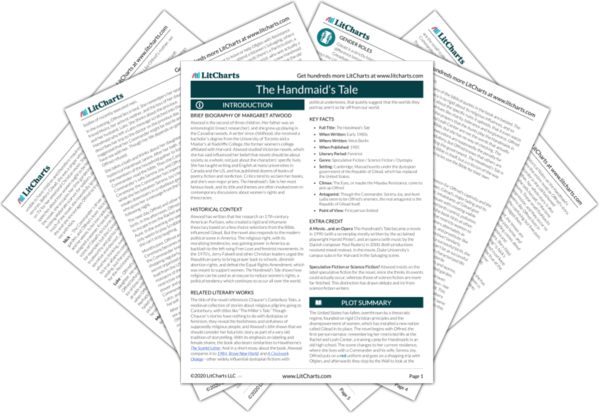Despite Offred’s general passivity in the face of the oppressive society, she has a deep and secret source of strength: her love. Though love might keep Offred complacent, permitting her to daydream rather than to rebel outright, it’s also responsible for the book’s greatest triumph, as love drives Nick to help Offred escape, which she manages more effectively than Moira or Ofglen. Her love for her mother, her daughter, Luke, Moira, and ultimately Nick, allow her to stay sane, and to live within her memories and emotions instead of the terrible world around her. Although the novel never proposes an ideal society or a clear way to apply its message to the real world, and although the novel looks critically both on many modern movements, including the religious right and the extreme feminist left, love—both familial and romantic—surprisingly turns out to be the most effective force for good.
Love is also a driving force behind other characters’ actions. We know that Nick reciprocates Offred’s feelings, but also the search for love, in the form of a real, not purely functional human connection, influences the Commander’s desires to bend the rules for Offred. In the end, love is the best way to get around Gilead’s rules, as it allows for both secret mental resistance, and for the trust and risk that result in Offred’s great escape.
Love ThemeTracker

Love Quotes in The Handmaid’s Tale
We thought we had such problems. How were we to know we were happy?
But this is wrong, nobody dies from lack of sex. It’s lack of love we die from.
He doesn’t mind this, I thought. He doesn’t mind it at all. Maybe he even likes it. We are not each other’s, anymore. Instead, I am his.
All I can hope for is a reconstruction: the way love feels is always only approximate.
And so I step up, into the darkness within; or else the light.











